Are you tired of bugs, harsh sunlight, or unpredictable weather interrupting your peaceful moments on the porch? A screened-in porch can be the perfect solution to enhance your outdoor living experience, offering a cozy, protected space to enjoy the fresh air without the hassle of external elements. But not all screens are created equal—choosing the right screen material and Atlanta screened porch builders is vital to ensuring comfort and durability.
With various options available, selecting a material that suits your climate, lifestyle, and aesthetic preferences is essential. In this blog, we’ll explain the different screen materials, key factors to consider, and tips for making the best decision for your home. Get ready to transform your porch into a serene, bug-free retreat!
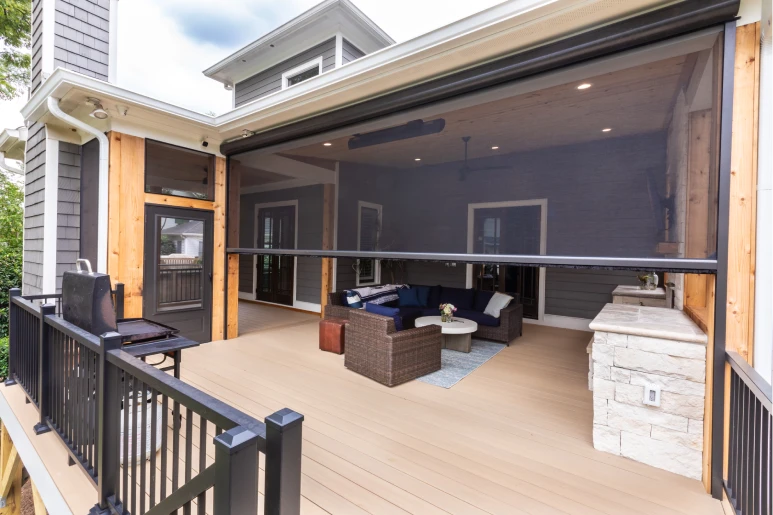
Why the Right Screen Material Matters
Selecting the proper screen material for your porch can greatly impact your overall safety, comfort, and area lifetime. It’s not only about convenience. For the following reasons, it is significant:
1. Privacy Control: Some screen materials are designed to provide enhanced privacy. They allow you to enjoy your porch without feeling exposed while still letting light in. This is especially beneficial for homes in densely populated neighborhoods.
2. Visibility and Aesthetic Appeal: Different screens offer various levels of visibility. Some materials are nearly invisible, creating an open, uninterrupted view of your surroundings. Others may slightly obscure the view but offer a more structured, stylish appearance.
3. Maintenance and Cleaning: Another factor is the ease of cleaning and maintaining the screen. Some materials resist dirt, mildew, or rust better than others, making them low-maintenance options that save you time and effort in the long run.
4. Customization Options: Many screen materials offer options for color and weave tightness, which can enhance your porch’s visual appeal and functionality. For example, darker screens may provide better visibility from the inside while adding privacy from the outside.
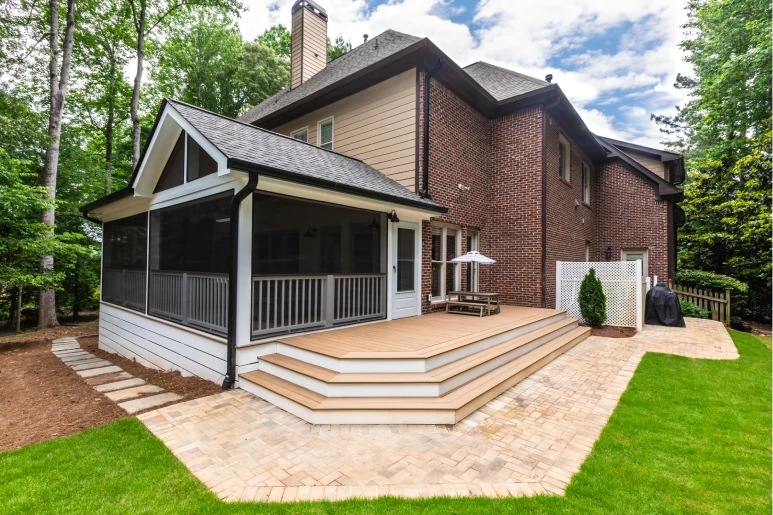
5. Wind and Rain Protection: In areas prone to strong winds or heavy rain, certain screen materials can provide added protection, reducing the wear and tear on your porch furniture and extending the life of your outdoor space.
Popular Types of Porch Screen Materials
When choosing the right screen for your porch, it’s essential to know the strengths and weaknesses of each material. Here’s a breakdown of the most popular types:
-
Fiberglass Screens
Pros: Fiberglass is affordable, flexible, and resistant to rust and corrosion. Due to its durability and ability to withstand most climates, it’s the most common option for porch screens.
Cons: It’s less strong than other materials and can tear easily in high-traffic areas.
Best for: Homeowners looking for a budget-friendly, all-purpose option for moderate climates.
-
Aluminum Screens
Pros: Stronger and more durable than fiberglass, aluminum screens are ideal for areas with strong winds. They are also rust-resistant and maintain their structure well.
Cons: They can dent more efficiently and, over time, may corrode in salty or humid environments.
Best for: Regions with heavy wind or where durability is a priority.
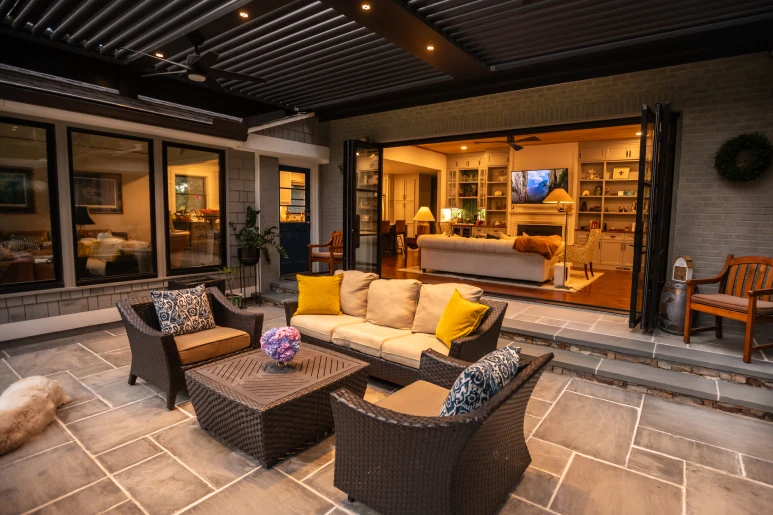
-
Pet-Resistant Screens
Pros: Made from vinyl-coated polyester or other rigid materials, these screens are designed to withstand scratches and tears from pets and children. They are several times stronger than standard fiberglass or aluminum screens.
Cons: More expensive than standard options.
Best for: Homes with pets or kids, where screens are more likely to be damaged.
-
Solar Screens
Pros: Solar screens are designed to block a significant amount of UV rays, helping to reduce heat, glare, and fading of outdoor furniture. They also help with energy efficiency by keeping your porch cooler.
Cons: These screens can reduce visibility and let in less natural light.
Best for: Porches that get a lot of direct sunlight or in hot climates where heat reduction is important.
-
Privacy Screens
Pros: These screens are made from materials with a tighter weave that provides more privacy without completely blocking light. They obscure the view from the outside but maintain visibility from the inside.
Cons: They may limit airflow slightly more than other options.
Best for: Porches in close-knit neighborhoods or those looking for added privacy.
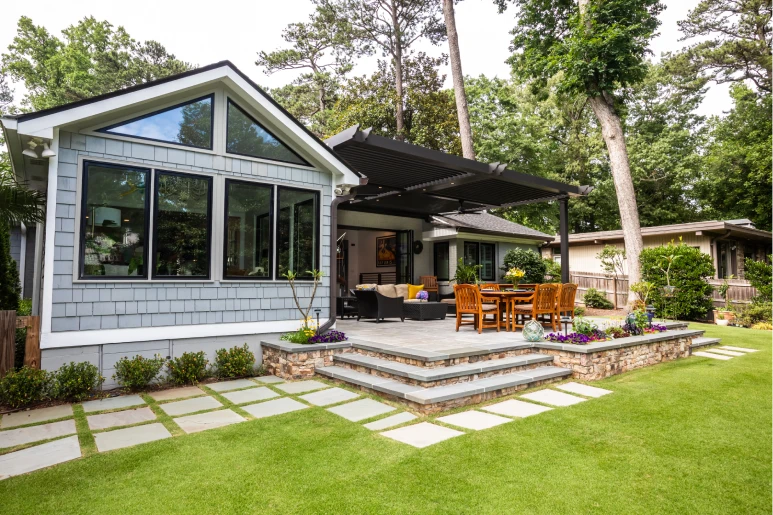
-
Retractable Screens
Pros: These screens offer versatility. They can be automated or manually operated, allowing you to retract them when unnecessary and pull them down when desired.
Cons: They tend to be pricier than fixed screens and require more maintenance.
Best for Homeowners who want flexibility or the option to have an open porch when the weather is ideal.
-
Stainless Steel Screens
Pros: Extremely durable and corrosion-resistant, stainless steel screens offer excellent protection from insects and larger pests. They’re strong enough to withstand harsh weather conditions and heavy wear.
Cons: More expensive than fiberglass and aluminum, and they can be harder to install due to their stiffness.
Best for: High-traffic areas, homes in storm-prone regions, or anyone looking for long-lasting durability.
Key Factors to Consider When Choosing the Best Screen Material
-
Climate and Weather Conditions
The local climate plays a significant role in determining which screen material best suits your porch. For example, some materials hold up better in humid environments, while others are more resistant to heavy wind or rain. Consider how much sun, rain, and wind exposure your porch will have throughout the year.
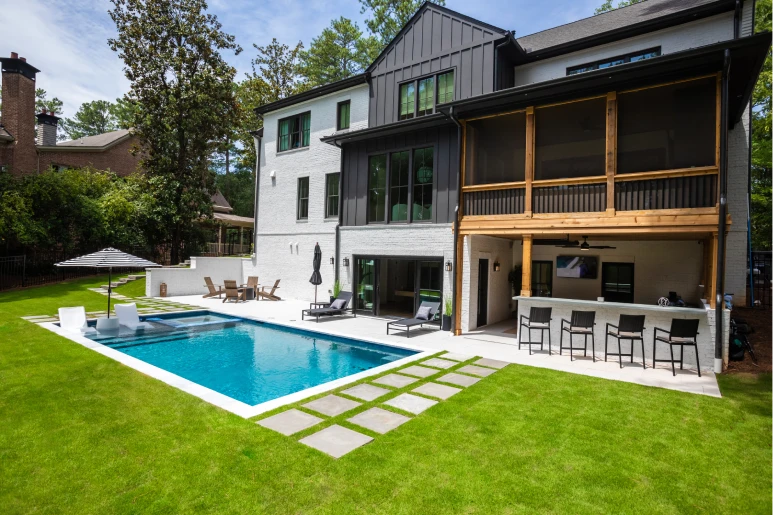
-
Durability and Longevity
Not all screen materials are equally durable. Some screens, like pet-resistant or stainless steel, are designed to withstand more wear and tear, while others, like fiberglass, are more susceptible to damage from pets, children, or heavy use. Choosing a long-lasting material can save you from frequent replacements and repairs by screen-in porch contractors.
-
UV and Heat Protection
If your porch receives a lot of sunlight, consider screen materials that offer UV protection. Solar screens, for example, can block a significant amount of the sun’s harmful rays, helping to keep your porch cooler and protecting your outdoor furniture from fading or heat damage. By regulating temperature, solar screens can also help reduce energy costs.
-
Visibility and Aesthetics
Different screen materials offer varying levels of visibility. Some, like fiberglass or darker privacy screens, provide a clearer view from the inside while offering a more concealed appearance from the outside. Consider how much you value clear visibility or prefer more privacy for your porch.
-
Ease of Maintenance
Maintenance is an essential consideration for any outdoor feature. Some screen materials are easier to clean and maintain than others. Fiberglass, for example, is low-maintenance and resistant to rust, while aluminum may require more frequent cleaning to prevent discoloration.
-
Pet and Child Resistance
If you have pets or children, it’s important to choose a screen material that can handle potential wear and tear. Pet-resistant screens are designed to withstand scratching or pushing without tearing, making them ideal for families with dogs or curious kids.
-
Budget
Different screen materials come with varying price points. Fiberglass is typically the most affordable, while pet-resistant, solar, or stainless steel screens cost more due to their enhanced durability and specialized features. Balancing your budget with the features most important to you is critical to making the best choice.
Benefits of Hiring a Professional Screened in Porch Contractors
Choosing professional screen porch contractors near you is more than just convenience—it’s about ensuring quality, durability, and seamless integration with your home’s design.
-
Expert Design Guidance
One of the biggest perks of hiring a professional is getting expert design advice. They know how to create screen porches that meet your needs and look great with your home’s existing style. With a professional, you’ll get a functional and visually appealing porch.
-
High-Quality and Durable Work
Professionals bring a level of quality and durability that’s hard to match with DIY projects. They use top-notch materials and follow proper construction techniques to ensure your porch lasts for years. Their attention to detail also ensures everything is built to code, so your porch will stand up to wear and tear without issues.
-
Increase in Home Value
A well-built, professionally installed screen porch can boost your home’s value. Buyers love outdoor living spaces, and a high-quality porch can make your home more attractive on the market. Investing in a professional build is suitable for your enjoyment and your home’s resale potential.
-
Faster Project Completion
Building a porch yourself can take weeks or even months. Professional screened-in porch contractors have the skills, tools, and team to do the job much faster. They handle everything from the design phase to the finishing touches so you can start enjoying your new space sooner without the hassle of long delays.
-
Reduced Risks and Problems
Building a porch has risks, from structural problems to safety concerns. Professionals know how to handle these challenges and follow safety protocols to prevent costly mistakes. Hiring a pro reduces the chance of going wrong and ensures the project goes smoothly.
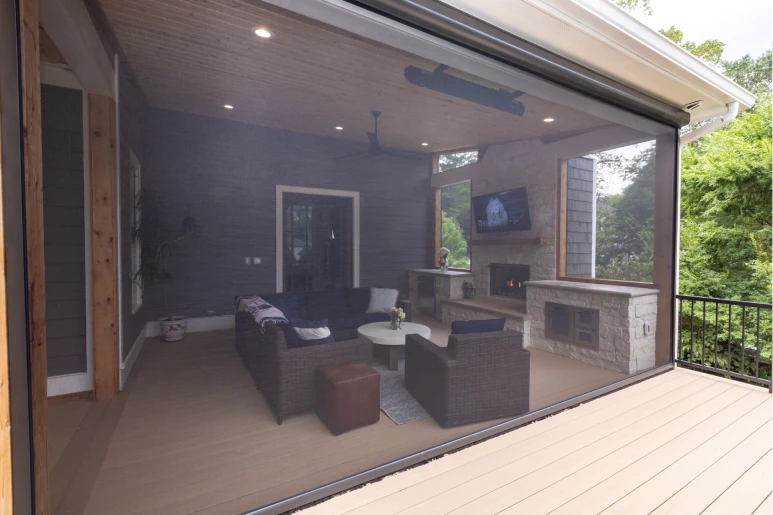
-
Long-Term Savings
While doing it yourself might seem cheaper upfront, hiring a professional often saves you money in the long run. Mistakes made during a DIY project can lead to expensive fixes later. Professionals like the Outdoor Makeover & Living Spaces team get it right the first time, preventing costly repairs. Plus, they can source materials at competitive prices and work efficiently, keeping overall costs down.
Maintenance Tips for Screen Longevity
Properly maintaining your porch screens can extend their lifespan and keep them looking and functioning like new. Here are some practical tips to ensure screen longevity:
-
Regular Cleaning
Clean screens twice yearly using mild soap and water to remove dirt and debris. A vacuum with a soft brush attachment also works well.
-
Inspect for Damage
Check for holes or tears regularly. Use a screen repair kit to fix minor issues before they get worse.
-
Protect from Pets and Kids
Install pet-resistant screens or keep furniture near doors to prevent pushing or scratching from pets or children.
-
Avoid Harsh Cleaners
Use gentle cleaners and avoid chemicals that damage or discolor the screen material.
-
Seasonal Care
Remove or reinforce screens during harsh weather, like storms or heavy snow, to prevent damage.
-
Lubricate Moving Parts
Lubricate tracks and hinges on retractable screens or screen doors to keep them functioning smoothly.
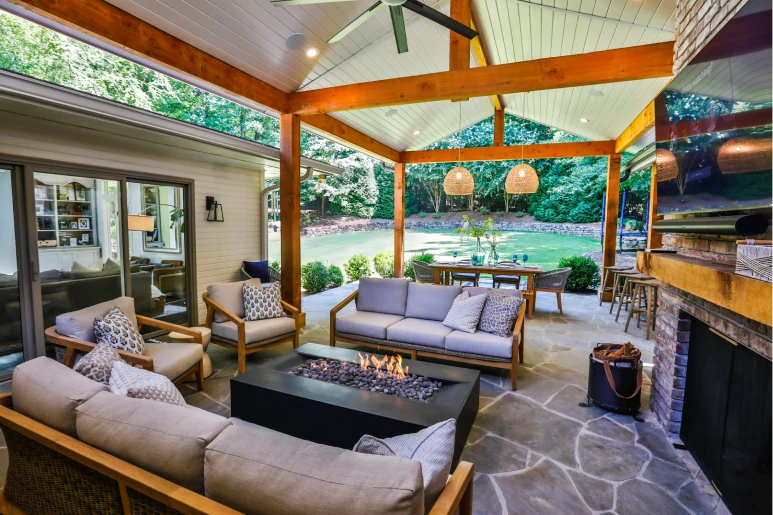
Conclusion
Ultimately, there are various materials you can use for your screen porch. Choosing the best material involves considering several factors. Consider your priorities, and select a screen that aligns with your preferences and porch needs for a comfortable outdoor space.
At Outdoor Makeover & Living Spaces, we are committed to providing expert porch screen installation. With our expertise and attention to detail, our team of screened-in porch builders near you is dedicated to transforming outdoor spaces into beautiful, luxurious living areas. Get in touch with us today!

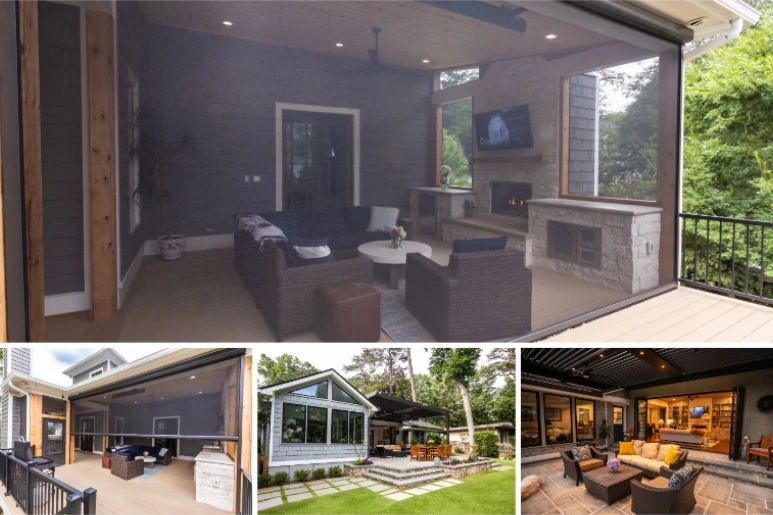
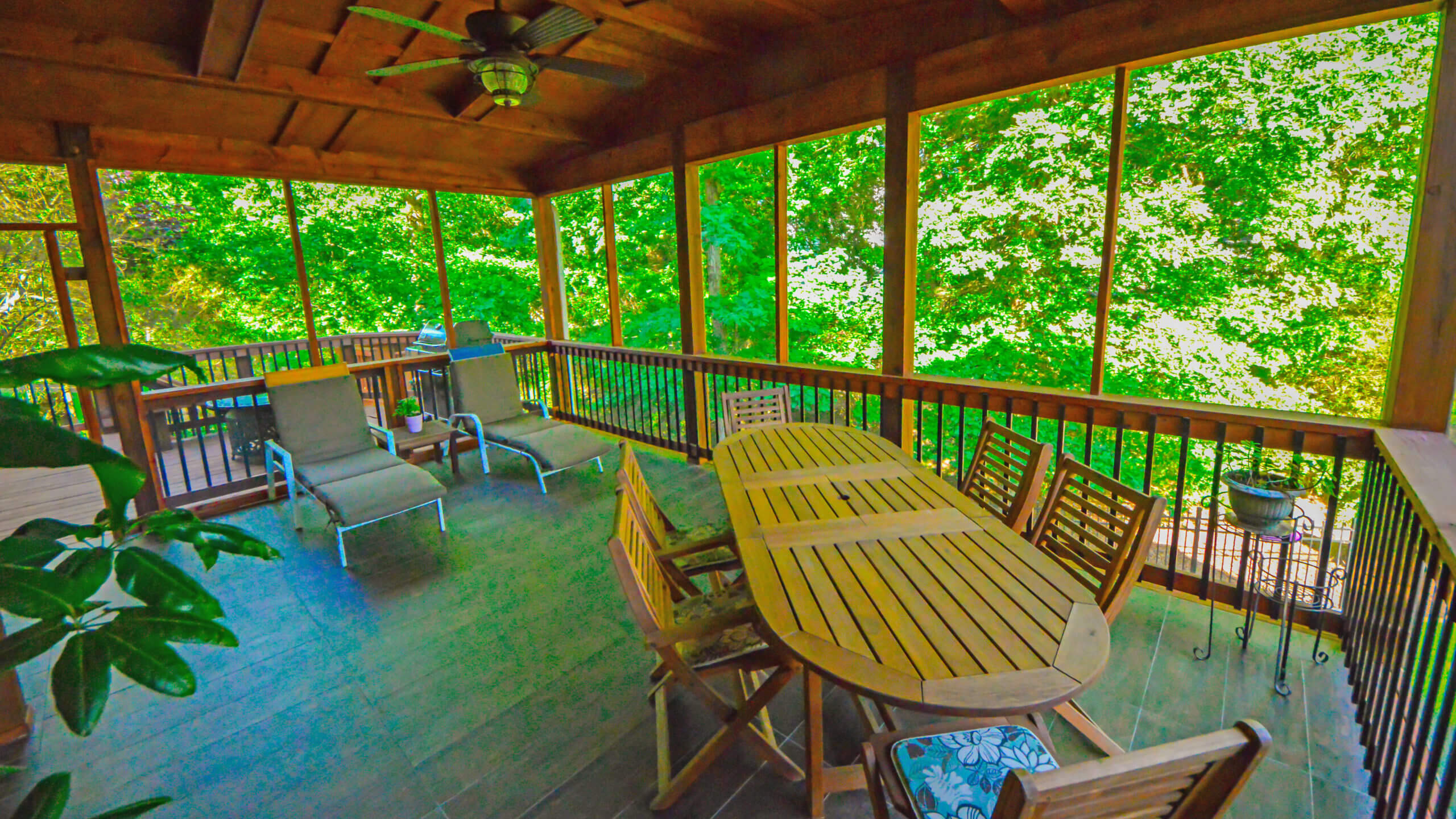 How to Keep Your Front Porch Looking Like New
How to Keep Your Front Porch Looking Like New Best Screened-In Porch Materials for Your Metro Atlanta Home
Best Screened-In Porch Materials for Your Metro Atlanta Home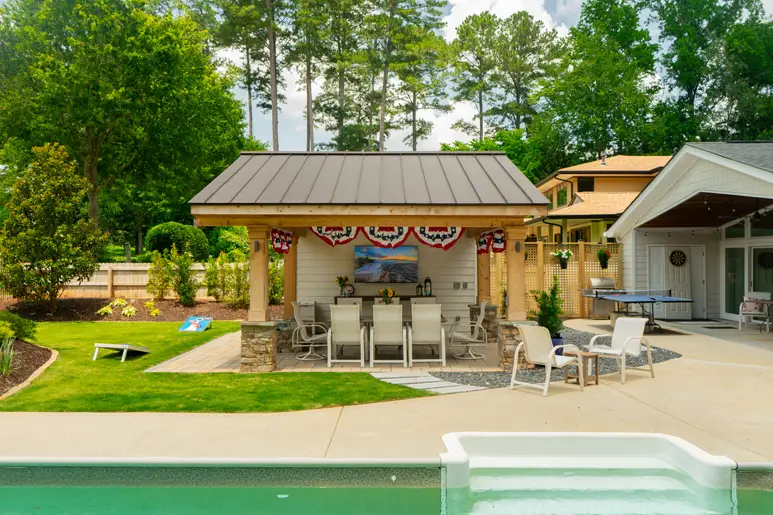 Benefits of Building a Porch In Your Backyard
Benefits of Building a Porch In Your Backyard
LET'S BE SOCIAL: